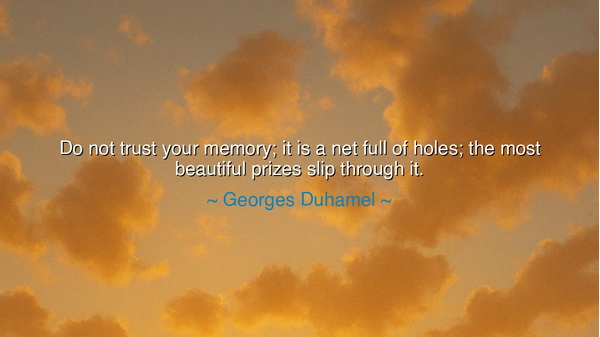
Do not trust your memory; it is a net full of holes; the most
Do not trust your memory; it is a net full of holes; the most beautiful prizes slip through it.






Georges Duhamel, the French physician, soldier, and writer, gazing into the fragility of the human mind, warned with piercing clarity: “Do not trust your memory; it is a net full of holes; the most beautiful prizes slip through it.” In these words, he captures a truth known to all who have lived long enough to see their memories fade like mist in the morning sun. The human heart clings to its moments — the first touch of love, the laughter of youth, the beauty of a fleeting triumph — yet the memory, though cherished, cannot hold them all. It is a net, and through its woven strands, much of life’s treasure escapes.
The ancients themselves understood the weakness of memory. The Greeks spoke of Lethe, the river of forgetfulness in the underworld, whose waters washed away remembrance. They knew that men forget not only their sorrows but also their joys, and that memory, though precious, is treacherous. The philosopher Aristotle declared that writing was the safeguard of wisdom, for words set down endure when the mind fails. Thus, Duhamel’s warning echoes the voices of antiquity: rely not upon memory alone, for it is a vessel that leaks even the richest wine.
History gives us examples of this truth. Consider the words of Samuel Pepys, who kept his great diary in the seventeenth century. In his own time, he wrote not for fame but to remember. And because he wrote, we today know the details of the Great Fire of London, of plague, of courtly life, of human frailty and hope. Without his pen, those moments — those “beautiful prizes” — would have slipped forever into oblivion. Pepys distrusted his memory and entrusted instead his words to paper, and thus his age lives still.
Yet think also of the countless voices never written, never preserved. The songs of forgotten poets, the testimonies of the oppressed, the fleeting wisdom of the old told only once by firelight — these were lost because they were left in the frail net of memory. Nations rise and fall, and with them vanish treasures of speech and song, because no one sought to preserve them. Duhamel’s lament becomes their epitaph: the most beautiful prizes slipped away.
Children of tomorrow, hear this lesson. Your mind is a wondrous gift, but do not be deceived into thinking it is eternal or unbroken. Do not trust your memory to hold all that is precious. Record your thoughts, write down your joys, preserve your wisdom, share your stories. For what is not preserved is soon forgotten, and what is forgotten is as if it never was. Memory alone cannot guard the treasures of your soul.
The lesson is plain: honor your experiences by preserving them. Do not let love’s first letter, a parent’s story, or a hard-won lesson vanish into the abyss of forgetfulness. Keep journals, create records, speak stories aloud so they may live in others. In so doing, you transform fragile memory into enduring legacy.
Practical action flows from this truth. Begin a habit of writing each day — even small details, even fleeting impressions. Preserve photographs not as empty images, but with the stories that give them life. Teach your children not only dates and names, but the memories of your heart. In this way, you will weave a stronger net, one that does not lose its prizes so easily.
So let it be remembered: “Do not trust your memory; it is a net full of holes; the most beautiful prizes slip through it.” Duhamel’s warning is not despair, but guidance. For though memory falters, we can choose to guard our treasures with care. And those who do will leave behind not emptiness, but a rich inheritance of truth, beauty, and wisdom that time itself cannot destroy.






AAdministratorAdministrator
Welcome, honored guests. Please leave a comment, we will respond soon